- Home
- Roxane Gay
Difficult Women Page 13
Difficult Women Read online
Page 13
Instead of saying something kind, instead of saying nothing when I told her my son was dead, my mother said, “How could you let this happen?” I started shaking and yelling at her but I made no sense, all yerga ghala fraty ghuja, crazy rage words. Ben took the phone. He said, “How dare you?” We stayed in the garage that night and the next night and the next night. The refrigerator where we store deer meat and High Life hummed loudly. We’d listen to it all night, pretending we were asleep, pretending sleep was possible. It was hot in there, smelled like motor oil and dirt and grass clippings. Ben kept his arms wrapped around me, never let me go.
We moved to a tent in the backyard until the neighbors complained. We cooked canned food on a small camp stove and drank wine and smoked, while we sat in lawn chairs until we were too tired to stay awake. Ben would say, “Talk to me,” and I’d try but nothing would come out but dry air. I took a leave of absence from work but Ben kept going to the office, said he needed one thing to make sense. While he was gone, I sat in the parking lot of the fancy grocery store where we bought eight different kinds of olives. Sometimes an employee recognized me and brought me coffee, said, we are so sorry. I heard that phrase so often it started to sound like one word, wearesosorry wesorry sosorry sosorry sosorry.
I lost all the baby weight that lingered and more. Ben grew angry when I said I couldn’t eat, said I had no right to ruin myself. One evening, he made my favorite pasta. When I refused to eat, he straddled me as I sat, and force-fed me. I couldn’t keep the food down. Ben got so angry he threw the beautiful clay bowl holding his beautiful pasta onto the kitchen floor. He made a terrible mess. His hands clenched into tight fists and I wanted to feel his knuckles against the bone of my jaw. I threw myself into him. I said, “Hit me,” but he wouldn’t. I hit him and hit him and he didn’t stop me. I said, “Hit me or I’m leaving.” He refused so I left. I slept in my car near the railroad tracks where we used to take Ben Jr. when he couldn’t sleep. My husband found me and told me to come home. I didn’t go home.
At a bar I found a man who would hit me. It wasn’t hard. I could smell the anger on him by looking at him. I was drinking Maker’s, wearing nothing much, all bare tits and leg. He sat next to me and ordered me a drink even though I wasn’t halfway through the one I had. He tapped my rings and said, “Where’s your husband?” I slammed back what was left of my drink and the one he bought me. “Don’t worry about it,” I said. He talked and we drank for hours and when he said, “Let’s go out back,” I let him pull me along. The man pushed me against the wall and covered my mouth with his like he was trying to eat my face. He came up for air, said, “How do you like it, baby?” I grabbed him by his belt. He tried to kiss me again and I turned away. I said, “I want you to hurt me,” so he did, over and over and over again. I stopped sleeping at home. Every time that man sank his fists into my body, I could breathe a little. I used one hurt to cover another. I became a fiercely tender bruise as he broke down my skin and muscle and bone and blood until I felt nothing but the way he used my body for a few perfect moments every day, moments I’d worry between my fingers until they were well worn away.
Ben grabbed me by my shoulders and shook me. “Say his name.”
“Harder,” I said.
The baby giggled. She grabbed his shirt and mine, like she was trying to pull us into each other. Ben stilled and looked down at the baby. He let go of me.
“Please.”
I clasped the back of his neck and stood on the tips of my toes. I closed my eyes and saw each letter, the shape of our child’s name. I tried to lose myself in my bruising. I put the baby in the playpen and walked to the nursery. Ben followed on my heels. I stood next to the crib, gripping the railing. Our child’s favorite teddy bear was still propped up in one corner. The sleeve of a small T-shirt peeked out from beneath the pillow. And then I couldn’t stand anymore. I fell to my knees, gasping.
“Hit me,” I said. I begged. I grabbed his hand and curled his fingers into a fist and held his fist to my breastbone. I said, “Please, if you love me, hit me.” My voice was so ugly and hungered. If Ben would break the broken places in me a little more, if he would break whatever was left of me beneath my skin, I could finally break all the way down.
Ben knelt beside me, uncurling his fingers. “I do love you.” He wrapped his arms around me as I reached for air. He was so gentle, so terrible.
“My God, please do it, Ben. Please.” A ringing in my ears made it hard to concentrate on anything but the bitter ache in my chest.
He pulled his arm back and I watched his fingers tighten back into a fist and I cried out but then he relaxed. “No,” he said. “I will not.”
I held on to that crib, shaking it, slamming it into the wall until the bolts loosened, until the crib that held our child broke all the way down, too. The B-E-N hanging on the wall above the crib fell to the floor. My arms grew tired and I let go of the broken railing in my hands. Sweat pooled in the small of my back. I thought about shoving everything in that room into my mouth, thought if I tried hard enough, I could make room. Ben leaned forward, pressing his forehead against the ground.
“I miss him as much as I love you. I love you as much as I miss him,” I said. I collapsed against him and somehow, we fell asleep like that, breaking against each other.
The next morning, we took everything from the nursery and put it in the backyard on our brick patio with the uneven edges. We burned all of it until it was nothing. The neighbors stared from behind parted curtains. They weren’t going to be our neighbors for much longer. I raised my middle finger high in the air. We stood and watched everything melt into a black, hardened mass—toys and sheets and T-shirts and very small shoes and pacifiers, all of it. When the fire finally died, our skin was coated with a thin layer of soot. The air reeked of the scorched memory of things that should not be burned. The baby slept and slept and slept.
We stumbled inside and I tore at Ben’s clothes, kissing him hard with the bone of my face, the whites of my teeth, wanting to feel something different even as my body ached sharply, everywhere. Ben folded me over the dining room table, his hand pressed against the back of my head as he entered me. He breathed hotly onto my neck. What we did, the way we sounded, was untamed.
After, I said, “Please get me away from here,” and Ben said, “Say our child’s name.” I held his face and wiped away some of the soot beneath his eyes with my thumbs.
In a few weeks, we would hand the keys to our house to a realtor who would eventually sell the house and wire the money to a bank account. We would tell Anna Lisa she would always know where we are. She would tell us she would not follow. We would pack what we needed in our car. We would put the baby in the backseat, listening to her babble happily. We would look back at that girl child, her features growing more and more determined with each passing day, and say this is crazy, this is wrong, this is right, this is wrong. We would drive north and west and north and west until we reached an ocean and rocky shores and green everywhere and a big, big sky to hold the baby up to while she laughed.
Before that, though, I kissed Ben, softer, softer. His curls spilled through my fingers. We tasted like the whitest heat of a fire closest to the ground where most things burn. I said Ben Jr.’s name into his mouth, memorized the charred taste of it.
Bad Priest
Father Mickey—Father Michael Patrick Minty, who went by Mickey to distance himself from the expectations of his mother—was having an affair with a girl named Rebekah. Rebekah was a perfume girl in a department store who still lived with her parents. She was not Catholic. Father Mickey’s mother, Nora Minty, a devout Catholic, named her son Michael after the archangel Michael because she was convinced, from the moment she laid eyes on her baby boy, that he would be a warrior for the faith. He was named Patrick for his father, may he rest in peace, who left Nora when Mickey was four, and died three months later from an excess of joy, Patrick Minty’s friends would later say, because he died in his studio apartment watching a baseb
all game with a six-pack of beer in his lap.
While his friends were told bedtime stories, Mickey Minty was nurtured with dark stories about the constant battle for salvation and how David beat Goliath and how Sodom and Gomorrah fell. Over and over, Nora would recite the Book of Daniel, Chapter Twelve, Verse One—”But at that time shall Michael rise up, the great prince, who standeth for the children of thy people.” He heard the verse so often that the words made him sick to his stomach. That is how, he later decided, the lining of his stomach began to give way to acid and ulcers.
No one was more surprised than Michael Patrick Minty when he entered the seminary and then the priesthood. It was a simple life, he told himself. He didn’t have to think that much. He would never have to support anyone. Mickey Minty wasn’t incapable of handling responsibility, but given his mother’s expectations, he simply didn’t have the energy for anything more. There were his parishioners, but at the end of the day, he could lock himself in the rectory, alone, without having to worry about anyone but himself. There was comfort in that, and that comfort made the sacrifices of the priesthood something he could endure.
Mickey Minty did not like to listen to strangers. He did not like to listen to anyone at all. The sounds of other voices, high-pitched and flighty or low and timid or any other variation, they all made him edgy and nauseated. There were days when he heard so many words detailing so many sins and sorrows and hopes and wants and needs that hot sprays of acid burned the back of his throat while he sat, hidden in the confessional, shifting his weight uncomfortably during particularly long excavations of human failing. Having to care, to soothe, to dispense was just too much. Worse yet was the way they looked to him for answers, eagerly listened to his counsel, believed, and dutifully carried out penance. What he hated was the way his parishioners had faith—faith that he would show them the way and faith that he would fight for their faith and faith that there was meaning in all this, and faith that there was something greater than themselves. Mickey Minty had very little faith so he lied to his parishioners. He lied so extravagantly that even though he was not a believer, he feared for his mortal soul.
Rebekah had very little interest in church or faith but she did have a great deal of interest in Mickey Minty, whom she met in the crowded waiting room of the county hospital, where she was waiting for a friend getting stitches. The friend, Ava, had put her fist through a glass door in a dramatic gesture meant to prevent her boyfriend from walking out on her. The gesture had failed spectacularly. Rebekah was waiting and Mickey Minty was sitting next to her wearing a light gray tracksuit while he waited to hear news about an elderly parishioner who had been taken gravely ill. Mickey was looking at Rebekah and listening as she told him how she had just broken up with her boyfriend César, who had just gotten out of rehab and was more annoying than ever with his newfound sobriety and the fervor of twelve steps and the belief in a higher power. She was not sure there was a higher power, she added, leaning in close, resting a perfectly manicured hand on Mickey’s knee as she crossed her legs. He tapped her knuckles with his fingers. “We have something in common,” he said.
Rebekah liked to talk to strangers, liked to pour her heart out, share the intimate and mundane details of her life with anyone who would listen. She was exactly the kind of parishioner who would get his stomach acids going but Father Minty liked studying her lower lip, full and pouty, slick with gloss. Her mouth, he thought, was perfectly designed for things he shouldn’t but often did contemplate. Her mouth was wide and her tongue seemed especially long, coming to a perfect point he would enjoy nipping between his teeth. His faith was temporarily renewed. Mickey also didn’t mind Rebekah’s cleavage, ample and well displayed beneath the tightly stretched silk of a summer dress. He looked up at the fluorescent lights, shaking his head, then returned his attention to Rebekah’s mouth. And not for nothing, she smelled sublime. Most of the time, he was around old people who smelled of ointments and cheap eau de toilette so he was particularly appreciative of the effort Rebekah put into smelling so damn good. Despite her incessant chatter, Mickey knew instantly that he would be more than happy to bend his vows on her behalf.
That night in the emergency room, Mickey Minty listened to Rebekah because she was wearing a short, tight dress and bright red lipstick and her bra straps were showing. She was the kind of girl his mother warned him about when he was a teenager. She was the kind of girl who would have never paid him any mind. He now decided that the way she was dressed was irrefutable evidence that she was the kind of girl who needed saving. This is what he told himself, as he told Rebekah that he was a priest. This is what he told himself, when he invited her for a tour of his church—a tour she took the following weekend, on a Saturday after Mickey Minty performed the O’Kelly wedding and wilting daisies were still hanging on the edges of the pews.
The first time they fucked, they were in the church, and it was late—two in the morning. Moonlight shone through the stained glass and Rebekah laughed and laughed because she liked the way her voice echoed beneath the vaulted ceilings. Rebekah wasn’t his first indiscretion, but he was greedy with her. The experience was largely unmemorable for Rebekah, though she remembered that his fingers smelled like incense and his breath tasted like mint. And she remembered staring at two larger-than-life crucifixes, the one hanging behind the altar and the one draped around his neck collaring him to his faithful service, and how they moved into and out of her sight with each of Mickey Minty’s vigorous thrusts.
A few nights later, Rebekah showed up at the rectory. Two in the morning, again, and she let herself in. She found Mickey Minty on the second floor, sitting on the edge of a narrow bed in a sparsely decorated room. He was holding a rosary and he was whispering. His eyes were open, but he hardly looked up as she entered the room. Rebekah slipped out of her raincoat, and she sat next to Mickey. She rested a cold hand on the back of his neck, sliding her fingers up through his hair, short, neatly kept. “You shouldn’t have come here,” Mickey said. Rebekah quickly slipped out of her clothes and lay on her back, draping one arm over her head. The sheets were clean but rough, the mattress thin but firm. She pulled one of Mickey’s hands between her thighs. He fingered the rosary beads with one hand and Rebekah with the other. Later, when Mickey was sleeping, his rosary beads still clutched in his hand, Rebekah watched him for as long as she dared, then left before the rest of the church staff arrived for their morning duties.
Rebekah thrived on hopeless relationships. Mickey was the most recent in a long line of inappropriate men who always left Rebekah intrigued but vaguely unsatisfied. What she liked about Mickey Minty was just how extremely inappropriate he was. She would never be able to introduce him to anyone she knew. He wouldn’t make grand gestures or treat her kindly. He wasn’t that kind of man, with or without the collar. And this heady combination of futility compelled Rebekah to fall madly, desperately in love with Mickey Minty. She gave very little thought to his spiritual obligations. They were minor details and if there was guilt to be had on the subject, she left that to Mickey, who did, after all, deal in such things.
Mickey had a flock to tend. Rebekah took to attending Mass—sitting in the front row and smiling, demurely, as he delivered stern sermons on adhering to Catholic doctrine while the world fell apart. He offered her the body, the blood of Christ, letting his fingers touch the moist tip of her tongue after placing the Communion wafer between her slightly parted lips. After Mass, after the cookies and punch in the atrium, after he had done the home visits to the sick and shut in, Mickey would take Rebekah out to dinner several towns over. They would sit in the back of the restaurant, on the same side of the booth. Mickey would remove his collar and Rebekah would rest her head against his shoulder, unzip his pants beneath the table, slide her hand into the crease, lightly stroking him as the waiter took their order.
She always ordered French onion soup and the roasted chicken. Mickey always ordered the porterhouse steak, rare, mushrooms on the side, and a glass of red wine
. When they were done eating, they would sneak into the men’s bathroom. They would go into the last stall. Mickey would turn Rebekah around so he didn’t have to look at her. He would pull her skirt up, slide his pants down, and fuck her, hard. He would grunt. He would pray under his breath. In his mind he would call her filthy names, then he would castigate himself for his indiscretion. Although he had little faith, he did have shame. When he was done, he would kiss Rebekah on her shoulder and inhale deeply, trying to identify the fragrance she had chosen for the day, always something different, a benefit of her job. He would send her back to their table and then try to clean himself with thin paper towels and foamy dollops of industrial soap.
On the nights when Rebekah knew she couldn’t risk sneaking into the rectory, she would call Mickey on the phone. She would talk about her job and her family and how César was still hanging around, trying to make amends. She would ask Mickey if that made him jealous and answer the question for herself. She would talk about her friends and the clubs where they partied and how she wished Mickey could meet the people who mattered. Mickey wouldn’t say much, though he would wince as his stomach churned, as he listened to Rebekah’s sins and sorrows and hopes and wants and needs. He would endure her confessions as his penance. He prided himself on his ability to endure. He would listen and reach into the drawer in his nightstand, fumbling for a bottle of antacid tablets. He would chew four or five and wash the chalky crumbs down with a sip of water. He would endure. Then he would ask her what she was wearing, and he would stare at the small wooden crucifix on the wall while Rebekah nurtured him with the filthy details of what she would do to him the next time they were together.

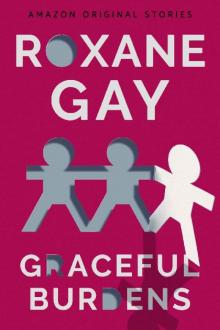 Graceful Burdens (Out of Line collection)
Graceful Burdens (Out of Line collection) The Best American Short Stories 2018
The Best American Short Stories 2018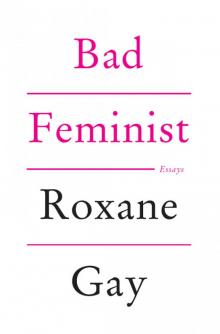 Bad Feminist
Bad Feminist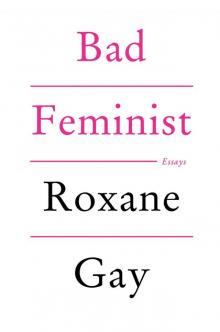 Bad Feminist: Essays
Bad Feminist: Essays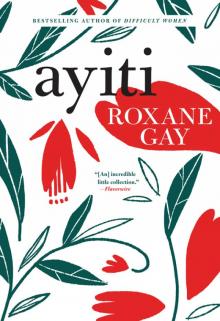 Ayiti
Ayiti Difficult Women
Difficult Women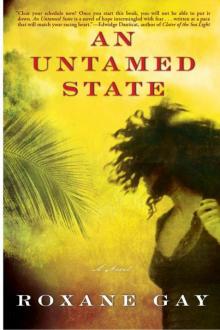 An Untamed State
An Untamed State Hunger
Hunger